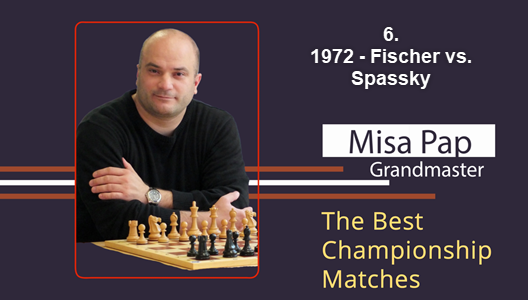Added on 4/8/2021

After Petrosian won the world title in 1963, he played 2 matches against his young challenger, Boris Spassky, in 1966 and 1969. First, he held his title in 1966, winning a close match by 4-3 and 17 draws! But in 1969, Spassky managed to win, again, a close match, 6-4, with 13 draws. To be fair, it was not a return match. Spassky had to qualify again through the whole cycle! He beat the famous Korchnoi in the Candidates' final match to become the challenger to Petrosian again. In 1972, the champion was Spassky, and since 1948, the world champion was always from USSR. At that time, Bobby Fischer was already world-famous and one of the best players around, but somehow, he had problems with the organizers on various occasions; therefore, he didn't manage to go until the end of the road and become a challenger. Even in the famous 1970 Match USSR – Rest of the world, which was played in Belgrade, Fischer played 2nd board because Larsen insisted that he play 1st! Indeed, in the previous year, he had better results due to Fischer's inactivity for some time.
A young Bobby Fischer Even more shocking is the case from the Interzonal tournament in Sousse, Tunisia, in 1967. Fischer was leading by a large margin, with 7 wins and only 3 draws, and then he left the tournament over a dispute with the organizers! Amazing. But finally, things started to work out for Fischer, and he managed to battle through the whole cycle this time. Again, not without curiosities. He didn't qualify for the Mallorca Interzonal in 1970. But Pal Benko agreed to give up his spot, and so Fischer was allowed to participate. Fischer won convincingly with 3.5 points over Larsen, who placed second! After that, the system changed to candidates' matches. The first 6 from Interzonal plus Petrosian and Korchnoi were the 8 candidates to enter those matches. Probably you already know what happened then: Fischer swept Taimanov and Larsen, with 6-0, without a single draw! Just to remind you: Larsen was second in the Interzonal in Mallorca in 1970! Fischer was in his "beast mode," and he was crushing everybody. In the final candidates' match, he beat Petrosian 6.5-2.5, and Bobby became the challenger. The match was named "Match of the century," and it was played in Reykjavik, Iceland, from 11th July to 1st of September. Before the match, Fischer had an Elo rating of 2785, and Spassky "only" 2660, so Fischer looked like a clear favorite. On the other hand, before this match, they played just 5 games, 2 draws, and 3 wins by Spassky! Maybe because of that, Spassky was not aware of what kind of chess genius he would battle. Just to mention, that mainly thanks to Fischer, the prize fund for the match was 250 000 USD, back then; it would be several million in today's money. Spassky won game 1 and then the (in)famous game 2 without play (Fischer had some dispute with organizers). When Fischer returned to play, he was simply too strong. Spassky was allowed to win just 1 more game, and the final result was clear: 7-3, with 11 draws.
A relaxed Bobby Fischer Fischer became champion, but he never played chess again. Bobby refused to defend his title against Karpov in 1975, and he lost it by forfeit. So, Fischer actually never lost his title over the board! Fischer left chess, but then in 1992, a miracle happened, and a Fischer – Spassky match was organized in Serbia and Montenegro, played in St. Stefan and Belgrade. They played in the famous "Blue Hall" in Sava Centar in Belgrade, where the match's second and final part was played. Security was very tight before the entrance, and the first 10 rows were empty (Fischer wanted no noise from the audience). Also, because of the same reason, they played on the stage behind a glass wall! No need to mention that Fischer won again, this time 10-5, with 15 draws. That was the last moment of chess glory for the great champion.